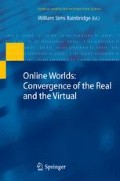Abstract
Medulla is an enabling technology designed to support the construction of complex synthetic environments, created by the Federation of American Scientists for learning, teaching, and research inside virtual worlds. It integrates the existing technologies to support the innovative use of digital art, media, documents, and software. In the past, educational technology projects typically reached only small audiences and quickly because they were locked into limited technologies and lacked a viable business model. Medulla is an open source collaborative toolset, independent of any particular virtual world platform, designed for use even by people not familiar with virtual worlds. Initial work has been completed on identifying the functionality needed for collaborative construction and use of virtual worlds for education, evaluating existing software tools capable of providing these services, and linking them together as seamlessly as possible using interoperability standards. Current demonstration projects include reconstructions of the ancient city of Uruk and one designed to teach algebra.
Access this chapter
Tax calculation will be finalised at checkout
Purchases are for personal use only
Notes
- 1.
http://www.khronos.org/collada/
- 2.
http://www.dspace.org/
- 3.
http://www.fedora-commons.org/
- 4.
http://shibboleth.internet2.edu/
- 5.
http://vworld.fas.org/wiki/Main_Page
- 6.
http://www.multiverse.net/index.html
References
Duranske, B. (2008). Virtual law: Navigating the legal landscape of virtual worlds. Chicago, IL: American Bar Association.
Kelly, H. (2008). Continuous improvements in undergraduate education: A possible dream. Innovations, 3, 133-151.
Lemley, M. A. & O’Brien, D. W. (1997). Encouraging software reuse. Stanford Law Review, 49, 255-304.
Lougee-Heimer, R. (2003). The common optimization interface for operations research: Promoting open-source software in the operations research community. IBM Journal of Research and Development, 47, 57-66.
Markus, L. M. (2001). Toward a theory of knowledge reuse: Types of knowledge reuse situations and factors in reuse success. Journal of Management Information Systems, 18, 57-93.
Ondrejka, C. (2008). Education unleashed: Participatory culture, education, and innovation in Second Life. In K. Salen (Ed.), The ecology of games: Connecting youth, games, and learning (pp. 229-251). Cambridge, MA: MIT Press.
Staley, D. J. (2009). Managing the platform: Higher education and the logic of Wikinomics. EDUCAUSE Review, 44, 36-47.
Stephenson, N. (1992). Snow Crash. New York: Bantam Books.
Thomas, D. & Brown, J. S. (2009). Why virtual worlds can matter. International Journal of Learning and Media, 1, 37-49.
Author information
Authors and Affiliations
Corresponding author
Editor information
Editors and Affiliations
Rights and permissions
Copyright information
© 2010 Springer-Verlag London Limited
About this chapter
Cite this chapter
Fox, M.R., Kelly, H., Patil, S. (2010). Medulla: A Cyberinfrastructure-Enabled Framework for Research, Teaching, and Learning with Virtual Worlds. In: Bainbridge, W. (eds) Online Worlds: Convergence of the Real and the Virtual. Human-Computer Interaction Series. Springer, London. https://doi.org/10.1007/978-1-84882-825-4_7
Download citation
DOI: https://doi.org/10.1007/978-1-84882-825-4_7
Published:
Publisher Name: Springer, London
Print ISBN: 978-1-84882-824-7
Online ISBN: 978-1-84882-825-4
eBook Packages: Computer ScienceComputer Science (R0)

